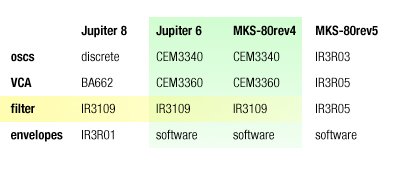::: Roland Filter Comparisons :::
So, there's a lot of confusion around what classic Rolands sound like other Rolands. And on keeping with my previous post on The History of Roland I figured i would put a concise thread together. First there is a master chart:
There's also a short cheat sheet jpeg for the big boys of Roland fame borrowed from here::
So, in my experience the Jupiter 6 and MKS 80 are very similar in sound ( i've used an MKS80 rev 4 ). not particularly 'deep' but capable and very useful.
But the Jupiter 8 sounds DEEP. Like DISCRETE transistor DEEP. It's beautiful sounding no matter how ugly a sound you make.
This is something the Juno 60 can do too in it's own way. Tight Big Clear Fast. But it's oscillators aren't as big feeling and they are DCO so they don't drift in any real musical way.
The JX 8P / MKS 70 / JX 10 are in a separate category all together. They are a bit grungier in sound and vibe and you sometimes have to work harder to get them to sing but it is in there. It's just not obvious at first or easy to squeak out.
The Juno family is split into two groups. The Juno 6 and 60 are almost identical. The Juno 106 / Alpha / and MKS 50 are thinner and less deep than the jupiter 6 and 8. The Juno 106 kicks ass above the others in this class though because it has all the tactile control and good MIDI implementation ( MKS70/MKS80 have decent implementation, the Jupiter 6 has barely any and the Jupiter 8 had none! )
So, you pick your battles with old hardware i guess. I happen to love the JP6 Europa because it's more MIDI slick than a Juno 106 and sounds way better. Plus you can do great interfacing with it! For instance, you can trigger the arpeggiator from an external analog source and the Europa JP6 will transmit the arpeggios created via MIDI. this is really fun for creating bass lines and other bouncy 80's bits on multiple instruments rhythmically generated from an 808 for instance...
food for thought...
::: IF :::
